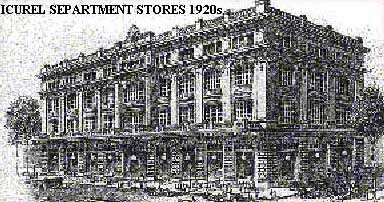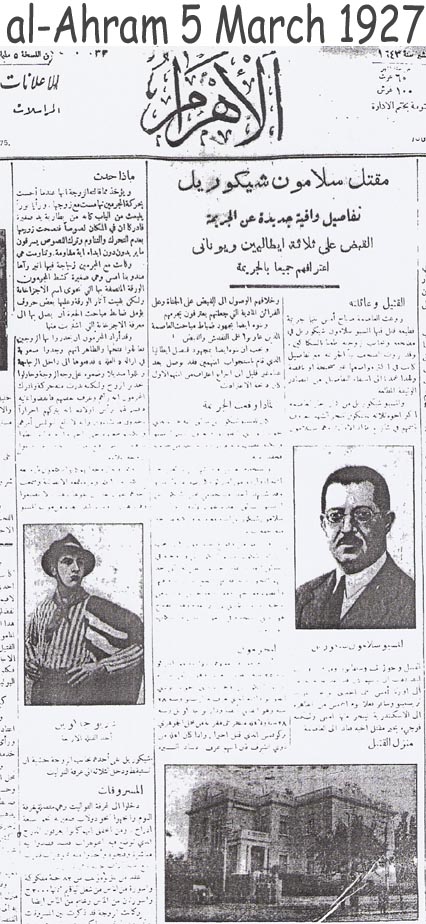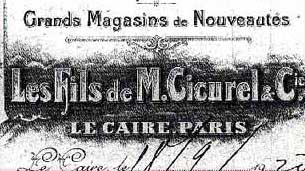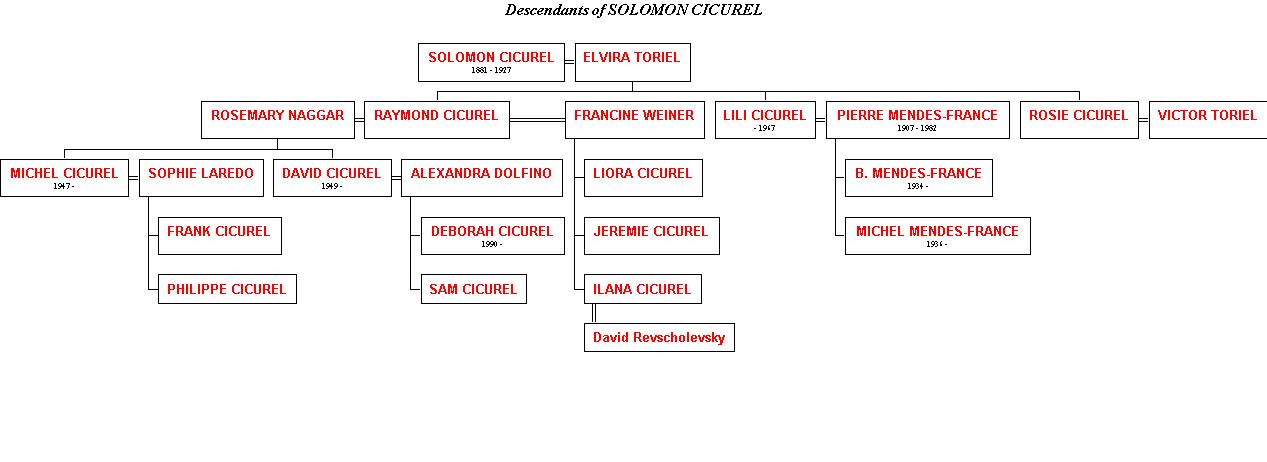by Samir Raafat
Al Ahram Weekly, December 15, 1994 (unedited version)

L-R: Joseph, Solomon, Salvatore and Moreno Cicurel
|
|
|
|
|
|
EGY.COM - JUDAICA
|
|
by Samir Raafat
Al Ahram Weekly, December 15, 1994 (unedited version)

L-R: Joseph, Solomon, Salvatore and Moreno Cicurel
SOLOMON CICUREL'S widely attended funeral procession crossed the entire city from Giza to the Jewish cemetery of Bassatine beyond Old Cairo. Traffic and normal business life were suspended for the occasion. Understandably, Messrs Cicurel Establishments were closed for the day. The other principal trading and commercial houses - Chemla, Gattegno, Ades, Levi-Benzion, Orosdi-Back, Simon-Arzt, Chalons, Cohenca, Morums, Salon Vert, Carnaval de Venise, Pontremoli, Rivoli, Hannaux - some dating back to 1882, also closed for the afternoon as a sign of respect. Almost all were Jewish-owned with the exception of Davies Bryan and Magasins Sedanoui, founded respectively by Welsh and Syrian migrants.
Cairene high society meanwhile was in a state of suspended animation in view of the horrific rumor circulated the day before and later confirmed in the morning papers. Solomon Cicurel, 46, had been fatally stabbed - eight times - shortly after midnight on March 4, 1927.
The scene of the brutal murder was the master bedroom of his stately Giza townhouse, which the Cicurels had purchased from the heirs of real estate mogul Auguste Leon Luzatto Pasha, the director-general of the Banque d'Egypte who died in Alexandria on February 19, 1909.
Cicurel's murder promised to be the most sensational drama of the year. The victim was the city's leading businessman-merchant who had made a fabulous career in retail merchandising. He was also the senior partner of the internationally renowned department store bearing his name. Les Grands Magasins Cicurel were Egypt's equivalent of Galleries Lafayette in Paris or Selfridges in London. Forever growing and expanding, a few days before his murder, Solomon had been negotiating the takeover of Morum's Oriental Stores in Attaba.
What added to the general astonishment was that Solomon Cicurel's villa (now Cairo University's School of Oriental Studies behind the Swissair building) was within sight of the well-guarded Giza Mudiria (governorate).
Also next to Cicurel's villa was Cairo University's School of Law, while on the opposite side of the shady Rimaha Street stood "Les Flamboyants" the imposing house belonging to the Belgian director of Egypt's Sugar refineries, Henri Naus Bey, President of the Federation of Egyptian Industries.
In fact, the entire ribbon fronting the Nile between the Pont Des Anglais and Khedive Abbas bridges (today al-Gala'a and Giza bridges) was festooned with princely residences occupied by prominent financiers, captains of industry and leading members of Egypt's landed class, many of whom were Cicurel's friends and associates. Not at all your typical death row.
In view of the victim's social standing the investigation into Solomon Cicurel's murder was personally headed by the Director General of Public Security Mahmoud Fahmi Keissy Pasha who would later become Egypt's minister of interior.
Assisting Keissy was a team of experts including Chief Public Prosecutor Taher Nour Pasha, the Mudir (Governor) of Giza Sadek Kholoussi Bey, and Ministry of Interior Inspectors Moustafa Hanafi and Chams al-Dine Abdel Ghaffar Beys.
Also on the case was the all-important British Commandant of the Cairo Police Sir Thomas Russell Pasha.
Most definitely Cicurel's murder was Cairo's most talked about event and because it was under the glare of the general public, no one was going to accuse the legal system of cheeseparing.
 The only witness to the crime was Cicurel's wife Elvire Toriel. She had little to say except that she "had been chloroformed by her husband's assailants."
The only witness to the crime was Cicurel's wife Elvire Toriel. She had little to say except that she "had been chloroformed by her husband's assailants."
Cicurel's children Rosie, 10, and Raymond, 6, also had nothing to say since they slept sleeping in another part of the floor under the watchful eye of their English governess Miss Williams.
None, except Elvire, had sensed anything of the night's ghastly events. At the time of the crime, Cicurel's other daughter, Lili, was in France studying art. As for the servants, they were quartered in a different part of the large house.
By the end of the first day four prime suspects were apprehended and charged with murder. Since they were all alien residents they were confined to the Foreigners Prison (Segn al-Aganeb) located behind Bab al-Hadid (today Ramses Station).
The culprits were Cicurel's Italian chauffeur Edouardo Moramarco and his friend Grimaldi Dagaro. Also implicated were Countess Debane's Greek chauffeur Anesthi Christo as well as a delinquent Jew by the name of Dario Jacoel. The latter was a self-proclaimed fascist and seemingly the brains behind the fatal "break and entry".
At first, the primary motive appeared to be burglary since Elvire Cicurel's jewels had disappeared from their hideaway in the master bedroom's adjoining bathroom closet. But during the course of the investigation it emerged there was another sinister reason behind Cicurel's murder. Anesthi Christo who had recently been in the employment of the Cicurels, had been dismissed for unsatisfactory behavior. It now appeared he had sworn vengeance against his former employer. Could the motive for Solomon Cicurel's murder therefore have been revenge?
The much-publicized investigation lasted several weeks. The assassins were tried and convicted separately. Egypt was still under the regime of Capitulations, which meant foreigners were exempt from local laws and taxes. This legal absurdity and its direct linkage to the question of sovereignty quickly became the subject of a heated political debate in both the Egyptian press and the country's new parliament.
The murder of Cicurel was quickly politicized. "How", cried the papers, "could it be that the two Italians were tried in Ancona, Italy, and the Greek defendant was tried by a Greek judge and jury at the Greek Court sitting in Alexandria so that each of the accused murderers received a different sentence commensurate with his country's criminal and penal code!!!
As for stateless Dairo Jacoel, his family was still trying to find him a passport of convenience so that he too could avoid Egyptian justice!
Because of the on-going publicity, soon enough everyone knew the story of the Cicurels and how they made it big in Egypt.
The murdered victim was the eldest of three brothers. Solomon, Salvator and Joseph were the sons of Moreno Cicurel, a Sephardic Jew who came to Egypt the previous century from Smyrna (Izmir), then a thriving cosmopolitan trading port in Turkey. A self-made man, Moreno, started his career as an employee with a co-religionist who owned a textile Shop in the Mousky district, Cairo's main commercial hub.
In 1910, Moreno opened Au Petit Bazar in Cairo's European Ismailia district at No. 3 Avenue Boulac (later Avenue Fouad) next to Chemla Frères (No. 11) one of Cairo's oldest department stores. Moreno Cicurel chose his locations well. Not only was Au Petit Bazar close to Opera Square where all the consulates and fashionable hotels - Continental Savoy, Metropole, Shepheards - were situated, but Avenue Boulac was fast replacing the Mousky and Hamzawi districts as the nexus of the Cairo commercial whirlpool. The area was also served by Cairo's oldest tramway Line No. 3 that crossed Cairo's east-west axis from the district of Boulac to the Citadel.
While Moreno Cicurel may have gone down in history as the founder of one of the largest department stores in the Middle East, unknown to him, he would make it into the Jewish annals for something totally unrelated to his line of work. According to notes left behind by Corporal Louis Isaac Salek, a Gallipoli veteran from New Zealand, the first Jewish flag ever to fly over Jerusalem since the city's fall to the Romans 2000+ years ago, was made by Moreno Cicurel. Assisting him in this particular endeavor was a tailor from Alexandria named Eliezer Slutzkin.
Unlike Israel's present flag, Salek's version was blue and white, the top half blue, the bottom half white with a Magen David in the center, but within the triangles there were rounded edges. Moreno's flag was brought to Palestine on December 11, 1917, by Corporal Salek who planted it atop the Tower of David - the Citadel - where it flew for 20 minutes before being removed by the British who had just conquered Palestine from the Turks.
In Cairo, meanwhile, Moreno Cicurel was making it to fame and fortune inflating the ranks of Egypt's French-speaking Jewish meritocracy. By the end of WW1, the Cicurel brothers became pillars of Egypt's cosmopolitan society with considerable commercial and financial clout.
In keeping with their newly acquired wealth, the Cicurels moved into the district of Ismailia, Cairo's affluent European quarter, occupying a large flat in Immeuble "T" owned by the Belgo-Egyptian Company. Situated at No. 6 Alfi Bey street where it intersects the fashionable Rue Emad al-Din, "T" building was also home to the famous fine foods and wine store, Jules & Henri Fleurent.
Not too far from Moreno Cicurel's new home, his shop Au Petit Bazar was mutating into what became the Cicurel flagship, Les Grands Magasins Cicurel et Oreco. For that purpose, Moreno commissioned the Armenian architect Garo Balian the nearby Green Building (No. 4 Tewfikia Square) to build him a giant emporium, which should compete in grandness with the neighboring Chemla.
At Cicurel everything could be bought and the range was endless, from lavish glass, crockery, fabrics, cosmetics to the latest Parisian fashions. Many a high society lady's trousseau was prepared entirely at Cicurel. But before all this came to be, Moreno Cicurel launched several other ventures including Au Rève des Dames, a haberdashery and ladies wear at No.19 Kasr al-Nil street. As his business expanded and as the Cicurels, père & fils, bought off and merged with, smaller competitors, Cicurel became Egypt's leading department store with branches in several of towns and cities. But running stores was not their only line of business.
In 1920, Moreno's other son, Joseph Cicurel joined forces with Talaat Harb Pasha and other Egyptian and Jewish notables to found Banque Misr with the objective of financing and creating numerous industrial and commercial ventures hereafter known as the Misr Group. This daring move aimed at breaking the foreign stranglehold over Egypt's economy, namely that of the British, French and Belgian shareholders of Egypt's banks and financial institutions. With equal devotion, Joseph Cicurel offered his financial and moral support to the increasingly anti-British, Zionist cause in Palestine while presiding over its Cairo branch. Joseph Cicurel's allegiances were not mutually exclusive.
With the death of Moreno and his sons, Solomon and then Joseph, it was Salvator Cicurel Bey (b.1894) who controlled the Cicurel business concerns up until his late brother Joseph's children, Clément "Clémy" and René were of age to join the company's board. His other nephew, Raymond Cicurel who had married into the wealthy Naggar-Smouha families of Alexandria, opted for an independent music career in France leaving his board seat to his mother, Solomon Cicurel's widow, the formidable Elvire Toriel.

Since Cicurel was primarily a family business Salvator was assisted by other nephews including Guy and Sylvain Cicurel, and Raphael Molho who married Salvator's niece, Denise Argi. The Cicurels were involved with every layer of their retail empire. From the day to day running of Les Grands Magasins Cicurel & Oreco to purchases, investments, fashion collections and PR. But whenever major decisions were required, the family did not fail to consult Salvator. A graduate of the HEC in Paris, he had invaluable hands-on experience and was perfectly capable of running the show single-handed if need be.
A great fencer and golfer, it was Salvator who captained Egypt's fencing team at the 1928 Amsterdam Olympic Games. Through his social connections he was well acquainted with Egypt's power elite. A leading member of Cairo's Sephardic Jewish community, Salvator Cicurel was elected its Vice President in 1943 and its President from1946 until 1957. His sportsmanship also earned him the Chair of the Jewish Maccabi Sports Club of which he was a great benefactor.
During WW2 Salvator separated from his first wife Céline Nahman ceding her their smart apartment at No. 12 Ibrahim Naguib Pasha Street, Garden City. At the recommendation of his cousin Donatienne Sapriel, he relocated to Maadi with his secretary-turned-consort Huguette Rofé. It was there that his son and daughter were born. Yet, even before moving to the suburbs, Salvator was well-known at the Maadi Sporting Club having won several "Desert Opens" played out at the Club's 18-hole sandy championship golf course.
According to Maadi contemporaries, Villa Cicurel at No. 57 Road 17, was the venue for many elegant soirées and garden parties. Unfortunately, neither the villa nor its garden remain today having been replaced in the 1980s with "Liberty House" one of two residential American Embassy compounds in Maadi.
In the late Î40s, when several companies and private fortunes were put under "special administration" because their owners were connected to either Zionist, Communist or Moslem Brotherhood activities, the Cicurels survived unscathed. They received no reprimand from either government or monarch evidencing their good standing with both. And when part of their flagship on Avenue Fouad was torched during the anti-British riots of January 1952, the Cicurels, proceeded undeterred to rebuild a newer bigger more functional store. Even when King Farouk's throne was toppled, Salvator relied on the goodwill of his friends amongst the Free Officers, many of whom were keen sportsmen and admirers of Egypt's former Olympic champion.
Little did the Cicurels realize they were in remission and that their retail empire had only a few more years to go before a new set of circumstances would bring it to all to an abrupt end. And yet, in a bizarre twist, perhaps Cicurel's fate could have been avoided had one of their relations intervened in time.
In 1933, Salvator's niece, Lili, the daughter of the slain Solomon Cicurel, had married Pierre Isodore Mendes-France, a member of France's old Jewry from whom she begot two sons, Bernard and Michel. Her husband's best man at the wedding was France's Prime Minister Edouard Daladier. A diehard politician, Mendes-France, often described as a French Cassandra for he always seemed at odds with his country's mainstream politics, became France's Prime Minister in 1955. Had his government lasted more than it did, he might have steered France away from disaster, for it was one of his successors, Guy Mollet, who precipitated the Suez Crisis of 1956.
The short term result of the Tripartite - Israel, Britain and France - debacle was the sequestering of all assets belonging to British and French nationals many of whom were Jewish. On the long term, the Suez War led to the intensification of the Arab-Israeli conflict. The Jews of Egypt had thus been integrated into the process of de-colonization.
As Arab nationalism gained ground, Salvator's privileged relations with the Free Officers, which had heretofore earned him a temporary reprieve, were no longer of use. With most of his assets already outside Egypt, Salvator made arrangements to join the rest of his family in Europe in 1957. But first, Les Grands Magasins Cicurel & Oreco S.A.E. capitalized at L.E. 600,000 and long regarded the jewel in the crown of Cairo's Avenue Fouad (now 26th of July Street), had to be sold. Three generations of Cicurel in Egypt were coming to a precipitated end.
In 1961, Grands Magasins Cicurel was sequestered (later nationalized) from its new Egyptian owners the (Hassanein) El Gabri family.

|
|
|
|
|
|
|